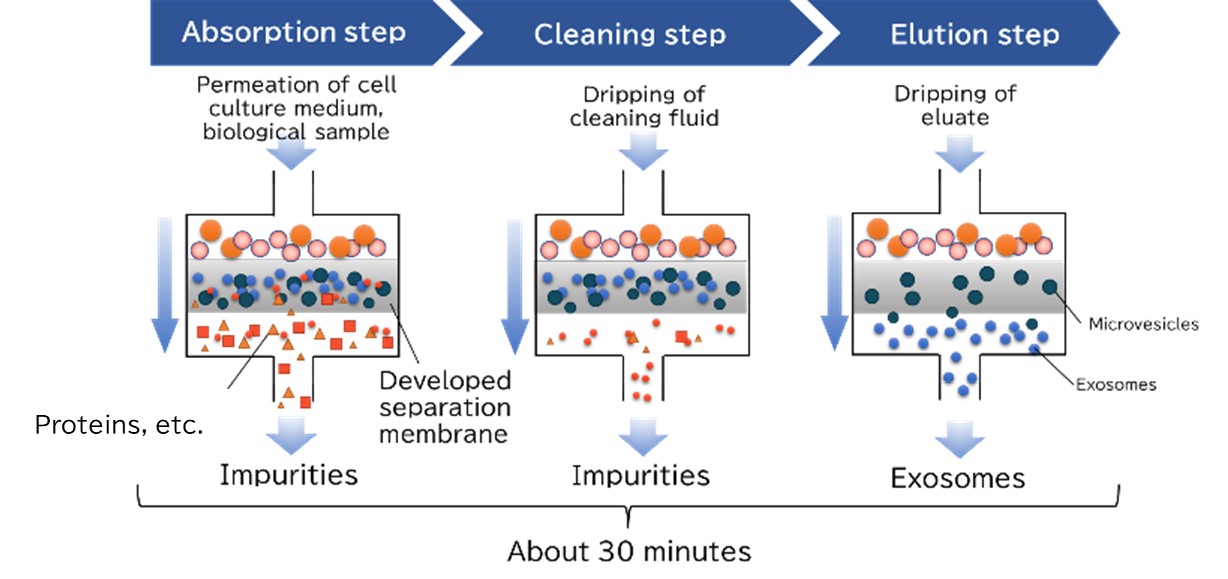Toyobo develops new purification technology capable of recovering exosomes with high efficiency, purity and yield by using separation membrane
- Looking for partner companies to achieve early practical applications for pharmaceuticals and diagnostic agents
Toyobo has developed a new purification technology that can recover exosomes from a cell culture medium and biological samples with high efficiency, purity and yield by using a separation membrane equipped with tiny pores and an ion-exchange function*1. Toyobo is looking for partner companies to achieve early practical applications for pharmaceuticals and diagnostic agents, and is thus helping to promote research and development involving exosomes.

Exosomes are fine particles (extracellular vesicles) measuring 50 to 150 nanometers that are secreted from cells. They are present in blood, urine and various other bodily fluids. It has been discovered that exosomes contain nucleic acids (microRNA, etc.) and proteins, and that they play an important role in intercellular communication, cell repair and other functions*2. In recent years, increasing attention has been paid to exosomes as a next-generation modality*3 that can be applied in a wide range of fields, including regenerative medicine and the diagnosis and treatment of diseases such as cancer. Research on exosomes is expected to advance worldwide, and the global market of products used in exosome research is expected to grow 35% annually through 2030*4.
The new purification technology that Toyobo has developed involves a separation membrane that has been microfabricated to possess an ion-exchange function that is capable of recovering exosomes with high efficiency, purity and yield. Toyobo has also developed an exosome purification kit that uses this technology. Currently, purifying exosomes is mainly carried out by using a method known as “ultracentrifugation.” But this presents problems: expensive equipment is required, purifying exosomes takes several hours, and the recovered exosomes are low in purity.
Toyobo’s exosome purification kit consists primarily of the separation membrane, cleaning fluid and eluate. This allows purification to be carried out with three simple procedural steps. First, in the absorption step, fine particles such as exosomes and microvesicles contained in blood, urine and other biological samples are separated from impurities such as proteins through tiny pores in the separation membrane. During this step, almost all impurities are removed. In the cleaning step, cleaning liquid is used to remove remaining impurities. In the final, elution step, exosomes are purified to high levels and recovered by harnessing the separation membrane’s ion-exchange function and the negative charge of exosomes. This does not require cumbersome preprocessing and allows the purification and recovery of exosomes in as little as 30 minutes*5.
Toyobo plans to look for companies and research institutions that are willing to be partners in promoting the application of exosomes in pharmaceuticals and diagnostic agents, and to provide prototypes of an exosome purification kit, possibly this year. It will contribute to advancing exosome-related research and development, which is being actively conducted worldwide, by providing this purification kit, which is capable of recovering exosomes with high efficiency, purity and yield.
| *1: | This purification technology was achieved as a result of research jointly conducted with Project Associate Professor Naohiro Seo of the Department of Bioengineering, the Graduate School of Engineering, the University of Tokyo. |
| *2: | Research in recent years has revealed that cancerous cells release exosomes to promote metastasis, and that exosomes are related to illnesses such as dementia and intractable neurological diseases. |
| *3: | Modality means any therapeutic approach such as small-molecule drugs, antibody drugs, nucleic acid drugs, cell therapy, gene and cell therapy and gene therapy. |
| *4: | According to a report released in February 2023 by DataBridge Market Research Private Ltd. and titled “Global Exosome Research Products Market—Industry Trends and Forecast to 2030” |
| *5: | The time required to purify 5 milliliters of culture supernatant (HEK293.2sus) |
For more information, contact
Public Relations Group, Corporate Communication Department, Toyobo Co., Ltd.
MAILpr_g@toyobo.jp
Cautionary Statement
This website contains forward-looking statements that reflect Toyobo's plans and expectations. These forward-looking statements are not guarantees of future performance and involve known and unknown risks, uncertainties and other factors that may cause Toyobo's actual results, performance, achievements or financial position to be materially different from any future results, performance, achievements or financial position expressed or implied by these forward-looking statements.






